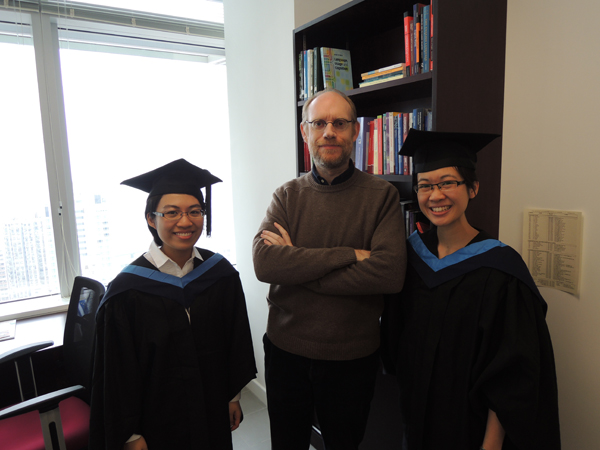Head Change by Dr Dirk Noël
By Dirk Noël

The School of English called on me to become Head relatively soon, less than a full seven years after I joined it, and consequently I will be known by only a small proportion of the readership of this Newsletter. It seems appropriate, therefore, that I introduce myself a little.
I joined the School in September 2006, close to twenty years into my career as a teacher and researcher in English language and linguistics, having previously held teaching and research positions in the universities of Antwerp, Ghent and Leuven, all in my native country, Belgium. Both in my teaching and my research my very broad area of interest is grammar, with a focus, naturally, on English, though I have also published on research that contrasts English with other languages, first and foremost my native tongue, Dutch. Courses I have taught so far in the School are ENGL1015 Introduction to English linguistics, ENGL2004 English syntax, ENGL2050 English corpus linguistics, ENGL2125 English construction grammar, ENGL2129 English as a language of science, and ENGL3036 Research seminar in English linguistics. None of our alumni will have done the first of these, Introduction to English linguistics, since it is a brand new course which I taught for the first time last academic year. It is one of a series of Introductory Courses that were launched last year as part of our new 4-year curriculum and offers a very broad survey of the central sub-disciplines of linguistics. English syntax is a course I have offered every year since I started teaching in the School because it is a very popular course. It deals with grammar — which, to my delight, I discovered to be an area of great interest in Hong Kong — and teaches students to talk about sentences, arguably one of the most fundamental concepts in English Studies. The English corpus linguistics course reveals me to be an “empirical” linguist who in his research draws data from large electronic text collections, or “corpora”. The course consists of a series of workshops in which students get hands-on experience in working with corpora. English construction grammar is the course that links up the most with my research, about which I will say a bit more in the next paragraph. It presents an alternative way of thinking about grammar, as a huge resource of building blocks, small ones and big ones, very simple ones and more complex ones, concrete ones and highly abstract ones, rather than as a system of rules. It also deals with the question of how these building blocks, or “constructions”, come to be part of the grammar of a language, specifically of course the grammar of English. English as a language of science first considers how English came to be the de facto default language of scholarship all over the world, and whether that’s fair, and then reflects on genre characteristics, as well as more narrowly linguistic features, of academic texts. In the research seminar course, finally, I have guided some of our best students through small individual projects that link up with my current research.
Spanning a career in linguistics of more than twenty-five years, my published research has dealt with aspects of a number of fairly diverse areas, ranging from discourse-pragmatic features of the news bulletins of the BBC World Service, over the complementation patterns of semantically similar verbs in English, French and Dutch, to recent evolution in the use of verbal modal expressions in World Englishes. There are two main strands to my current research. The first of these is aimed at exploring the advantages of a (contrastive) construction grammatical approach to historical linguistics. In a theoretical article published in 2007, I made the case for distinguishing between Diachronic Construction Grammar and Grammaticalization Theory, or more precisely for subsuming the latter framework under a much wider diachronic constructionist one, and in subsequently published descriptive research I have provided illustration of the heuristic value of (contrastive) diachronic construction grammar. Some of this is joint research with Dr. Timothy Colleman (Ghent University) which contrasts the history of certain constructions in English and Dutch. Together we recently secured funding from the Hong Kong General Research Fund for a project on constructional attrition, which will investigate the disappearance of constructions from the grammar of a language. The second strand of the research I am currently involved in is joint work with Professor Johan van der Auwera (University of Antwerp) on the evolution of expressions of modality in World Englishes. This research is specifically intent on exploring various methodologies for garnering information about the structural development of New Englishes, in the absence of historical corpora of such varieties of English.
Let me conclude by saying that, naturally, I feel honoured to have been entrusted with the daily running of the School. It is a big responsibility. What keeps me from feeling overburdened by it is the knowledge that there is excellent support staff in the School Office and that I can draw on the experience of previous Heads, not least that of my immediate predecessor, Otto Heim — whose wisdom and administrative genius it will be difficult to match, though — as well as the realization that a School is not defined by its Head, but by the collectivity of its teachers and, of course, its students. I am confident as well that — to adapt a sentence from a novel I recently finished reading, set in a department of English of a fictional American university — the School will go on with the momentum it has gathered through its tradition and the mere fact of its being (John Williams, Stoner).

Our apologies, you must be logged in to post a comment.